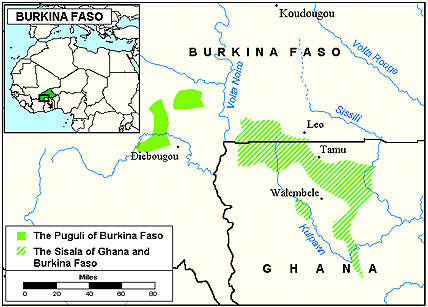The Puguli, also known as Pwo, primarily reside in northwestern Ghana and southern Burkina Faso. They are part of the larger Sissala people group, and many people collectively refer to both groups as the Sissala due to their shared culture, location, history, and language. The Puguli and Sissala speak closely related languages from the Atlantic-Congo branch of the Niger-Congo language family.
The Pwo primarily inhabit the savanna grasslands of Burkina Faso, which are interspersed with scattered trees and scrub bushes. During the colonial period in the 19th and early 20th centuries, these areas remained largely isolated and were neglected by British influence. The British only established a government station with modern amenities, such as schools and hospitals, in the town of Tamu, located within Sissala territory. Most Pwo, however, lived outside the town in compact villages made up of mud huts connected by narrow paths.
The Pwo economy is primarily based on farming, with households growing their own food. The main crops include millet, yams, peanuts, rice and beans. Women typically manage household gardens, where they cultivate vegetables such as okra, onions, tomatoes and red peppers. Farming is supplemented by the gathering of wild fruits and nuts, fishing in local rivers, and hunting. Additionally, they raise livestock, including cattle, sheep, goats, pigs and chickens.
In the Pwo community, poverty extends beyond the individual; it reflects on the entire kinship group. Therefore, all members of the household share in work responsibilities. Elder men supervise and control the production and consumption of crops, while younger men handle physically demanding tasks like land clearing and tilling. Women also participate in planting, weeding, and transporting crops back to the home. In addition to agricultural duties, men hunt, fish, produce medicines, and engage in wood carving and blacksmithing. At the same time, women are responsible for food preparation, caring for children, gathering items from the bush, and making pottery.
Pwo villages are compact, typically ranging in size from 200 to 3,000 people. Each village is organized into several compounds, which are households that include extended families known as janwuo. A janwuo averages about 50 people and is further divided into smaller family units. Related extended families, usually paternally linked, live near one another, separated only by narrow passageways. This arrangement fosters communal defense and protects wild animals and witches.
The birth of children is a significant source of joy for the Pwo community and is considered essential for ensuring the continuity of the extended family. When a girl gives birth to her first child, she is officially recognized as a woman. The birth of additional children strengthens the bond between husband and wife and elevates the woman's social status. Infants are kept close to their mothers and are cherished and shown affection by other family members, including the father. As babies are seen as innocent and pure, they are treated with great love and care. Girls typically remain with their mothers until they marry, while boys begin living with a senior male member of the janwuo starting at the age of six.
While some Pwo have embraced Islam, most continue to follow their traditional ethnic religions. They believe in a supreme being named Wiise, the creator of all things, who is deeply involved in human affairs and observes every detail of their lives. Although they do not know the exact dwelling place of Wiise, they believe that their moral behavior and rituals help maintain universal order. According to their worldview, the universe cannot exist without humans actively preserving this balance.
The Pwo people face numerous physical, social, and spiritual needs. In addition to their necessity for Christian resources and evangelism, they require significant improvements in education, healthcare, infrastructure, and economic development.
The Pwo have limited access to Christian resources, and very few individuals have encountered the gospel. While some have remained in their traditional religious practices or have converted to Islam, the majority have never heard the message of Christ. There is an urgent need for prayer and evangelism to lead them to a saving knowledge of Christ. Introducing gospel materials in their native language and culturally relevant teachings will make the message more accessible and impactful.
Educational opportunities in many Pwo villages are scarce. Although some formal education is available, improved school infrastructure, including trained teachers, educational materials, and better facilities, is needed. Expanding these opportunities will empower future generations and provide them with the skills necessary for improved livelihoods.
The Pwo have limited access to healthcare, especially in rural and remote villages. There is a pressing need for better healthcare facilities and access to medical professionals. Common health issues include malaria, respiratory infections, and malnutrition. Mobile clinics or health outreach programs could help alleviate some of these challenges.
The Pwo rely on a subsistence farming economy but struggle with limited access to markets, credit, and financial resources. Their agricultural techniques are traditional, although there is potential to enhance yields with modern farming practices or technologies. Providing training in sustainable farming methods and helping them access fair markets for their goods could strengthen their economic stability.
There is a critical need for better infrastructure in Pwo villages. Improvements such as better roads, a reliable clean water supply, and access to electricity would significantly enhance their quality of life. These developments would also improve healthcare access, facilitate trade, and encourage educational advancement.
Pray for the Lord to send dedicated laborers to minister to the Pwo in Burkina Faso.
Ask the Holy Spirit to guide and empower missionaries and individuals focused on the Pwo. Pray that God strengthens Pwo believers and gives them the boldness to share Christ with their people.
Pray for the development and distribution of gospel materials in the Pwo language.
Scripture Prayers for the Pwo in Burkina Faso.
https://www.webonary.work/phuien/files/2019-June-3-Phuo-Worldview-Burkina-Faso.pdf?lang=en
https://www.sil.org/resources/archives/99050
Written by: Paulette Serwaa Amaniampong
| Profile Source: Joshua Project |











